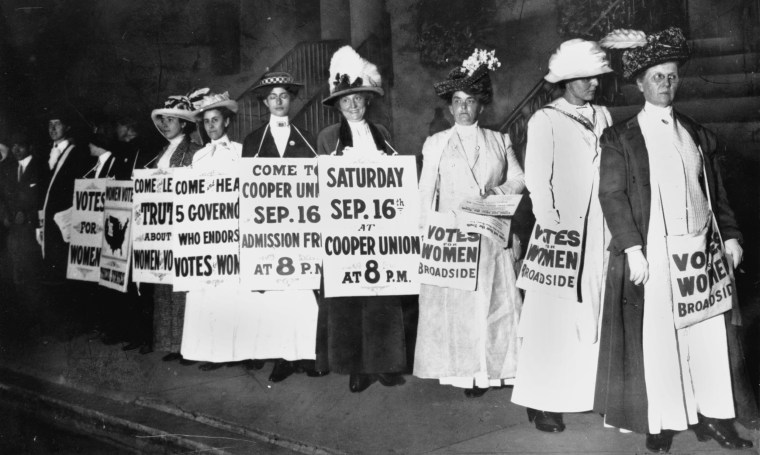Tuesday marks the 100th anniversary of the 19th Amendment. When the words “the right of citizens of the United States to vote shall not be denied or abridged … on account of sex” were added to the U.S. Constitution on August 18, 1920, it seemed that, at long last, women got what they deserved.
But looking back through a century-long lens, this clearly was just another step on a rocky path to equal rights and women’s empowerment — a journey that continues today. After 100 years, the same issues that women were grappling with back then — voting rights, inequality, racism and sexism — are very much behind the social upheaval we’re seeing now.
The 19th Amendment is often thought of as the one that gave women the right to vote, but the fact is that it did not deliver on that promise. Though scores of Black activists (formerly enslaved Sojourner Truth, journalist Ida B. Wells and educator Mary Church Terrell, to name a few) all played critical but largely unacknowledged roles in the fight for women’s suffrage, the amendment was far from inclusive. Native Americans and Chinese immigrants were not granted voting rights. Black women were subjected to Jim Crow laws and not fully enfranchised until the Voting Rights Act of 1965 was passed a full 45 years later.
Even today, barriers persist that keep many Americans from exercising their Constitutional right to vote. Blatant suppression efforts — such as overly strict I.D. laws, voting roll purges, restrictions on mail-in ballots and inconvenient, understaffed and limited polling places — disproportionately impact women, people of color, voters with disabilities, students and older people.
When early feminists fought for the franchise, their hope was that it would more fully integrate women into the economic, cultural and political life. “There never will be complete equality until women themselves help to make laws and elect lawmakers,” activist Susan B. Anthony said decades before the 19th Amendment was ratified. But in hindsight, she and her fellow activists were concerned with the rights of white women, not all women.
Indeed, progress toward our nation’s goal of full equality has been slow and halting, sometimes moving backward before pushing ahead. We hear a lot about the gains women have made in American politics, but the halls of power remain far from equal: Although women are half the population, the 101 women in House of Representatives are only 23.7 percent of that legislative body. Just slightly over a quarter of the 100 seats in the U.S. Senate are held by women. Of the governors of the 50 states, only nine are women — a mere 18 percent. Women of color hold just a fraction of those seats. We’ll need a lot more “Years of the Woman” until we’re fully represented.
No doubt women have made great progress in the past 100 years, but true equity eludes us. We now comprise nearly half the workforce, yet we’re subject to a pay gap that threatens our economic security from the moment we enter the workforce. Women, disproportionately women of color, hold nearly two-thirds of the country’s low-wage jobs, undervalued labor that is essential to a functioning economy.
We’re confronting a workplace that hasn’t adjusted to our presence, one that’s modeled on an outdated notion of how families work and old paradigms that favor men. And we’re still encountering the outright racism and sexism that Rep. Alexandria Ocasio-Cortez so eloquently called out last month after a fellow legislator referred to her with a vulgar and gendered insult. His dismissive attitude represents an “acceptance of violence and violent language against women [and] an entire structure of power that supports that,” Ocasio-Cortez said, calling for a change to dehumanizing bigotry and misogyny that’s so deeply ingrained in our culture. Her commanding presence on the House floor encapsulated both how far women have come since the 19th Amendment was passed – but also how far we still have to go.
Change takes time, no matter how urgently we need it or how impatient we are to see it happen. But right now is an opportune moment: With the country reeling from a global pandemic, a controversial presidency and a broad-based movement against 400 years of structural racism, the time feels ripe to push for sweeping changes to the status quo. And while we might draw inspiration from the determination of the early feminists, we must broaden the goals and acknowledge that there will be no justice, equity or equality until everyone has access to the same basic civil rights.
Specifically, we need to double down on our efforts to expand access to the polls, including enacting the John Lewis Voting Rights Act of 2020, which would enable more citizens to have their voices heard. We must work to elect candidates who are committed to racial justice, gender equality, diversity and inclusion. We must advocate for laws to close the wage gap and the wealth gap, modernize the workplace, provide paid sick and care giving leave, ease the burden of student debt and open pathways to success for all Americans, regardless of race, gender, ability or immigration status.
But policies and programs are not enough: As individuals, we must listen, learn and examine our own attitudes and biases to continuously improve. Human behavioral change must match whatever policies and practices we put in place. That’s the only way to keep things moving forward, rapidly forward.
If the coronavirus pandemic has taught us anything, it has shown us we can make dramatic changes when it’s necessary. And, just as it was 100 years ago, social change is necessary. So let’s hold off on a celebration of an incomplete amendment, and instead use this anniversary to commit ourselves to doing the unfinished work of achieving equal rights for all.
Kim Churches is the CEO of the American Association of University Women, a national non-partisan nonprofit that works to advance gender equity for women and girls through research, education and advocacy.
